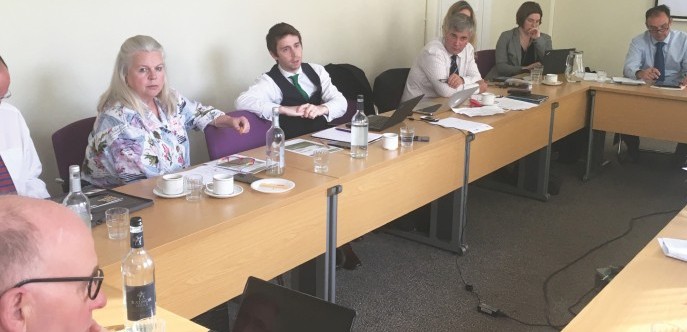The NPA Producer Group has set out its Brexit priorities to Defra officials.
The group had some clear message for the Government when two Defra officials spent a morning at the group’s latest meeting in London.
The officials were there to establish the pig sector’s priorities – and concerns – as the Government maps out its post-Brexit policies. Their appearance came hot on the heels of Michael Gove’s landmark Oxford Farming Conference speech, in which the Defra Secretary set out his vision to replace the current area-based farm support system with a policy based on ‘public money for public goods’.
However, the producers stressed that the pig sector’s main post-Brexit priorities involved the Government doing its job in key areas, so they could do theirs.
“Trade is a key priority,” said NPA chairman Richard Lister, stressing the industry’s desire to maintain barrier-free EU access, particularly for cull sows, alongside further building our growing and increasingly critical export markets.
Producers told Defra officials the farming sector must not become a ‘sacraficial lamb’ to facilitate new trade deals that benefit other sectors.
Vice-chairman Richard Longthorp highlighted the need for equivalence in terms of production standards in relation to imports, pointing to methods that are banned here but commonplace in countries like the US and Brazil, such as sow stalls and use of feed additive ractopamine.
Further points were raised about ensuring our animal disease border controls are sufficiently robust, the need for the Government champion British food in its procurement policies, access to EU labour and proportionate regulation.
The Defra officials pointed to Mr Gove’s Oxford assurances that the Government will not compromise UK standards in trade deals and his pledge to improve the Government’s patchy record on public procurement.
New funding for the sector?
When the conversation moved onto farm support, they stressed that there would be new funding available to the pig sector.The definition of ‘public good’ is likely to be quite broad and include on-farm productivity and efficiency, alongside the environment, animal health and welfare, encouraging new entrants and public access, they said.
Specific areas where the pig sector could benefit from funding were discussed, including exports, marketing, development and take-up of new technology, investment in new buildings and equipment, staff training and apprenticeships.
The group made it clear the use of loan guarantee schemes for new buildings, better on-farm application of R&D and environmental measures to assist outdoor producers would all benefit the industry.
With capital funding certain to be part of the package, producers were wary of the strings often attached, but agreed, if made proportionate and not overly burdensome to apply for or comply with, there could be real gains for the pig sector
The officials promised to feed back the group’s views into the various Brexit policy streams.
After the meeting, Mr Lister said: “It was very useful to have this two-way discussion with Defra.
“There will no doubt be some great funding opportunities for the pig sector, but our main message was that our priorities are for the Government to get it right on areas like trade, labour, procurement, border controls and regulation, so we can stand on our own feet, as we always have done, and forge a bright future outside the EU.”




